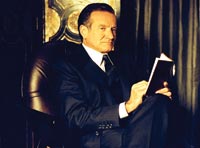The dead live on in our memory, or so the saying goes. And these days, our memories are increasingly shaped by the high-tech artifacts we leave behind; to a certain degree, the home videos and Web pages we produce have spared us the ancient task of holding on to the past through personal recollections and shared stories. Now imagine that, instead of, say, a nicely framed photo standing next to a casket, you could show a short film taken straight from the brain of the deceased. The actual sights and sounds that that person experienced, or at least a heavily edited version of them, would then be preserved forever, or for at least as long as anyone felt like watching them. You might even be tempted to claim that such films conferred a form of immortality on the dear departed.
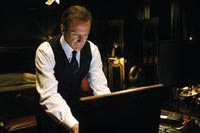
This is the premise of The Final Cut, the latest in a series of intriguing, if flawed, films that explore where our technology might take us in the not-so-distant future. Robin Williams stars as a “cutter”—a person who edits the memories of the dead—named Alan Hakman, who has a reputation for his willingness to tackle the ugliest memory cases. Hakman believes he is responsible for the death of a boy he met when he was young, and he is so emotionally crippled by guilt that he does his penance, as it were, by willingly overseeing the memories of those whose lives were especially full of things to feel guilty about.
Like other recent sci-fi films, such as Code 46 and I, Robot, the film begins by setting out the laws under which its protagonists operate. Cutters themselves, we are told, are not allowed to have the memory-saving “Zoe implants,” which are planted in some children before they are born; because they see the most intimate secrets of so many other individuals, a single cutter’s own memories of those other cases could cause quite a scandal if they got into the wrong hands. In addition, cutters may not give or sell the memories they have been assigned to anyone else, and they may not mix the memories of different people.
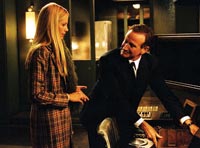
Although these rules are no doubt designed to soothe the public’s fears, the technology behind the implants is still opposed very strongly by an increasingly vocal, and violent, band of protestors who wear “electrosynth tattoos” to inhibit the implants that have been put within their own bodies, and who chant such slogans as “Remember for yourself!” and “Live for today!” One of them even tells Hakman, “You are blasphemous!”
Exactly what writer-director Omar Naim wants us to think of these activists is unclear; you suspect he shares their basic concerns, and yet their aggressive, antagonistic posturing would seem to make them the villains of this story. Intriguingly, it also turns out that one of the key figures in this movement is a former cutter named Fletcher, who is played by Passion of the Christ star Jim Caviezel, seen here sporting a rather dark tan and a very fake-looking beard and moustache. The fact that Caviezel now plays a morally questionable character with ties to religious zealots lends an ironic subtext to his exchanges with Hakman, who skeptically asks at one point if Fletcher is concerned for his soul.
The story’s spiritual implications are made explicit in other scenes, too. When Hakman’s girlfriend Delila (Mira Sorvino) sees his editing equipment—or “guillotine,” as those in the biz call it—for the first time, she remarks, “You’re a mortician—or a priest—or a taxidermist. All of them.” And when Fletcher asks Hakman how he can stand to delete so much evil from a person’s life, how he can maintain the illusion that bad people were decent, Hakman appeals to the tradition of “sin eaters”—figures who take the sins of the deceased onto themselves, so that the dead may enter the afterlife. Hakman also says, defensively, that he can “forgive” people for their sins, even if others can’t.
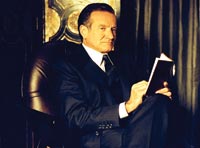
But this is, of course, a weak reply, and not simply because it is only God who can forgive sins, or because it is only Jesus who can take away the sins of the world. Hakman’s defense would also seem to contradict what he tells the wife of his latest project: “The dead mean nothing to me. I take this job because I respect the living.” Hakman’s forgiveness is not born out of compassion, but out of a sort of numb apathy.
Thus, Hakman perhaps inadvertently underscores the fact that the short films he produces are essentially narcissistic—not on the part of the people whose memories form the content of the films, but rather, on the part of those people who commission the films. Hakman interviews the families and friends left behind by his subjects so that he can shape the memories in a way that will serve the needs of those other people, and he deletes episodes of, say, adultery and spousal abuse as a matter of course. The end result is that each “re-memory” service is ultimately not so much a tribute to the person who died, but a deceptively soothing tribute to the people who attend the ceremony, where each person can persuade himself or herself that the loved one whose memory they are ostensibly there to celebrate saw all those people in the best light possible.
It brings to mind a remark that C. S. Lewis made in A Grief Observed, the journal in which he recorded his thoughts after his wife Joy died. In there, he expressed his own distress over the fact that the real Joy was no longer there to prevent herself from becoming a figment of Lewis’s imagination. “The rough, sharp, cleansing tang of her otherness is gone,” wrote Lewis. “What pitiable cant to say, ‘She will live forever in my memory!’ Live? That is exactly what she won’t do. You might as well think like the old Egyptians that you can keep the dead by embalming them.” And embalming, of a sort, is what Hakman does.
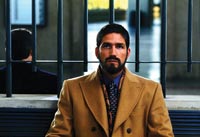
Like a lot of futuristic films, swallowing the film’s premise requires the viewer to overlook a few plot holes—if cutters are licensed, as they must certainly be, then it seems, at one crucial point in the story, that applicants for the job are not screened as thoroughly as they ought to be—but the moral issues it raises are thought-provoking indeed. And the film has the timeless, natural look of the better low-budget sci-fi flicks; instead of souped-up digital backdrops and sleek metallic props, the film gives us old-fashioned cars, majestic British Columbian forests and laptops with varnished, wooden keyboards. And if the script seems a bit thin in places, or if the three lead actors all seem to have rather limited dramatic range, the film compensates with inspired moments such as the scene in which Hakman shows Delila some of his “outtakes”—clips in which the memory implants recorded not what the subjects’ eyes happened to see, but what they saw with their minds.
Most significantly, the film underscores the fact that the meaning of our lives ultimately comes from somewhere outside of ourselves. One cutter remarks that people in her line of work have to make “story decisions” when sifting through memories, and the film ends on a somewhat chilling note, suggesting that our lives may be squeezed into stories that suit the agendas of others—and not the sort of stories that we would have preferred. But of course, we already have to live with these sorts of dilemmas, whenever we discuss the sinners, saints and others who have lived before us; and in a sense, an even bigger version of this process awaits all of us after we die. It is in God’s perfect and loving memory that our lives will ultimately find their narrative shape. He, in the end, is the one with final cut.
Talk About It
Discussion starters- Are we obliged to remember only the best things about people? What about the not-so-good things? Does it make a difference if the person is alive or dead when we come back to these memories or share them with other people?
- One of Hakman’s subjects is seen as a baby, a child, and an adult; he is a fairly typical boy in the early scenes, but he turns out to be an abusive adult. How do these different parts of a person’s life fit together? Should they be kept separate? What if the person’s life story had stopped at an earlier point? Which part of a person’s life is the “real” him?
- Do you think people would behave differently if they knew that there might be a perfect record somewhere of what other people have seen and heard them do? Or if they knew there might be a perfect record of their own experiences, seen from their own point of view?
- Of course, those who believe in God know that someone is “recording” our every move. Do we act like we believe God sees everything we do? Do you think your secret experiences will stay between you and God, or do you think others will see them, in the afterlife?
The Family Corner
For parents to considerThe Final Cut is rated PG-13 for mature thematic material, some violence, sexuality and language. There are references to wife-beating, adultery, child abuse and the like in some of the memories Hakman edits, but nothing explicit.
Photos © Copyright Lions Gate Films
What Other Critics Are Saying
compiled by Jeffrey Overstreetfrom Film Forum, 10/21/04Writer/director Omar Naim is earning compliments for providing some thought-provoking science fiction along the lines of Minority Report, but most critics agree that The Final Cut is too flawed to earn raves.
Robin Williams plays Alan Hackman, who works as a “cutter,” editing the recorded histories of people in a future world where all memories are recorded and archived. Hackman “cuts” undesirable memories in order to honor the dead and liberate them from the darker parts of their lives. But as he prepares “Re-memories”—presentations that amount to ‘highlight reels’ of a person’s life for their loved ones to enjoy after they are gone—he runs into trouble from an activist (Jim Caviezel) who views the group’s work as unethical.
Peter T. Chattaway (Christianity Today Movies) says it’s “the latest in a series of intriguing, if flawed, films that explore where our technology might take us in the not-so-distant future. Most significantly, the film underscores the fact that the meaning of our lives ultimately comes from somewhere outside of ourselves.”
Michael Elliott (Movie Parables) says, “Naim makes an auspicious debut with this intriguing film that works as both a thriller and a springboard for the discussion of moral or ethical questions. Perhaps a more experienced filmmaker might have handled some of the philosophical issues with a bit more flair or finesse but Naim strikes a nice balance in keeping the film both thought-provoking and entertaining.”
Mainstream critics would like to see a different cut.
from Film Forum, 10/28/04David DiCerto (Catholic News Service) says, “The Final Cut raises intriguing ethical questions but is weighed down by its cheerless performances and slumberous pacing.”
Copyright © 2004 Christianity Today. Click for reprint information.



